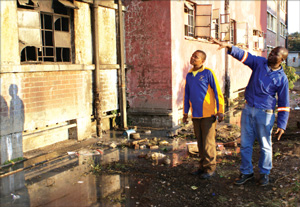
ON June 20, Zimbabwe joined the rest of the world in commemorating the United Nations World Refugee Day, but for Sibonile Sibanda, a mother of four, the day was characterised by bitter memories of the loss of homes, household property, the pain of beatings and deaths during Operation Murambatsvina.
NQOBANI NDLOVU STAFF REPORTER
“It is still like a horrifying dream when we recall caterpillars destroying our home in Makokokoba,” Sibanda, told Southern Eye on Thursday. Sibanda and hundreds of others were dumped by the government at old and squalid Sidojiwe Flats after Operation Murambatsvina in 2005 – flats that were condemned as unfit for human habitation years ago.
Sidojiwe Flats is located at the Belmont Industrial area, a few kilometres from the central business district. Surrounded by closed companies and a dense bushy area, Sidojiwe can easily be mistaken for an area that was deserted by people fleeing war.
The entrance to the two blocks of flats sums up the dilapidation of the buildings – broken windows, pitch dark corridors and a bad stench from burst sewer pipes, welcomes visitors.
A malfunctioning sewer system has become a hallmark of the flats, which house more than 300 families that share one common kitchen, five colonial era toilets without water and one bathroom.
A curtain or blanket divides a room shared by two families with their children. “We are abusing our children honestly,” Sibanda said. “I mean, there is no hiding when we are being intimate.
“There is just no privacy between us (her and husband) and my children and also with the other family that we share the room with.” Patricia Nkomo, a mother of two weighed in: “I just want to leave this place. We are just here because we have nowhere to go.
- Chamisa under fire over US$120K donation
- Mavhunga puts DeMbare into Chibuku quarterfinals
- Pension funds bet on Cabora Bassa oilfields
- Councils defy govt fire tender directive
Keep Reading
“We have been promised stands countless times and with the coming elections, we are now bombarded with the same promises.” Both Nkomo and Sibanda say a number of residents at the flats have registered to vote in the upcoming elections, saying they will vote for whoever seems to be sincere with providing them with alternative accommodation.
The government promised better houses after bulldozing and demolishing homes of thousands of families under the internationally condemned Operation Murambatsvina.
According to Amnesty International, more than a one million people were left homeless while 90 000 children had their schooling disrupted during the operation that President Robert Mugabe defended as necessary to prevent Zimbabwe’s suburbs turning into another Kibera – a reference to one of Africa’s largest slums, on the outskirts of the Kenyan capital, Nairobi.
A month and some weeks after the operation, the government launched a rehousing scheme – Operation Garikai – but the few houses that were built were reportedly given to well-connected individuals and their friends, leaving thousands like residents of Sidojiwe Flats, angry.
MaDube, the residents’ chairperson who refused to reveal her first name, said it has been a painful wait since 2005, indicating that they have since formed a housing co-operative among themselves to buy stands and build their houses.
“It has been false promise after false promise,” she said. “We ended up forming our own housing co-operative to buy stands. Recently, council allocated us 53 stands.”
The problem – most of the families in the housing co-operative do not have jobs to raise $3 000 to buy the stands.
Members of the co-operative contribute $20 per month – a figure still way beyond the reach of many. Last Thursday, when Southern Eye visited Sidojiwe Flats, Joseph Gumbo, a businessman and aspiring Mavambo/Kusile/Dawn legislator for Bulawayo South, was campaigning and promising better housing.
“I blame Zanu PF for the suffering of these people,” Gumbo, who had hired a plumber to fix the broken sewer pipes, said. “The GNU (Government of National Unity) also failed to assist these people. I promise to provide them with stands and building materials.”
Gumbo and the Murambatsvina victims said Zanu PF should be sued for destroying people’s homes but Matshobana Ncube, a human rights lawyer, said that was no longer possible.
“In terms of the law, they should have sued before years elapsed,” Ncube said last week, but indicated that the new Constitution can assist them get compensation.
“There is a provision in the new Constitution that says everyone has a right to shelter and it goes further to state that the State cannot destroy any property without a court order.
“It recognises that a newly-elected Parliament can enact retrospectively to provide for compensation.” MaDube said they “have been pushing and pushing” and it has been a chain of failed promises.
For her and the other residents – while the majority say “home sweet home” — they need courage to continue enduring the suffering, being exposed to the health hazards owing to the streams of sewer everywhere.










